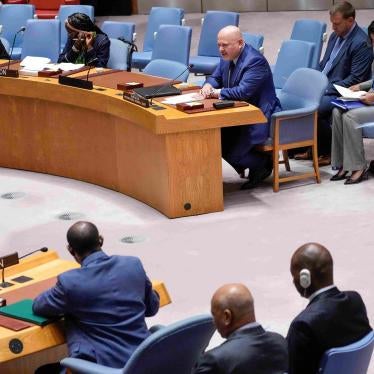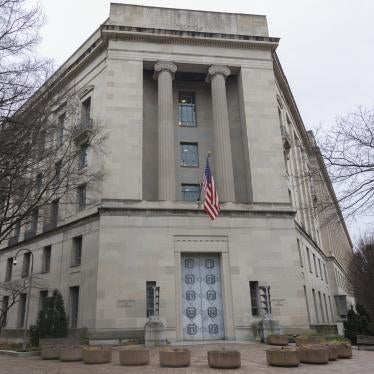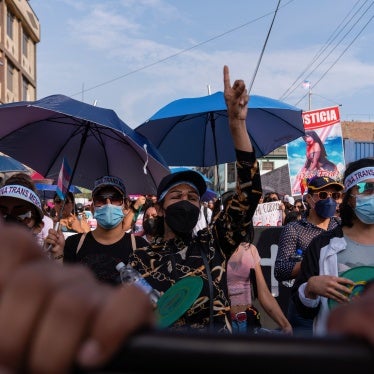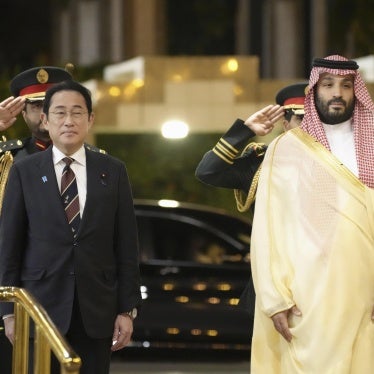Dear Mr. Attorney General and Mr. Fonzone:
We are writing to request that you publicly release any unclassified written guidance that the Office of Legal Counsel has issued regarding the conditions under which the U.S. government can lawfully support the International Criminal Court (ICC) investigation of atrocities such as those recently committed in Sudan’s Darfur region.[1] The signatory organizations submit this request under the Freedom of Information Act, 5 U.S.C. § 552.
Since the outbreak of war across Sudan in April 2023, the parties to that conflict have committed atrocities that the U.S. Secretary of State has found amount to crimes against humanity, war crimes, and ethnic cleansing. The ICC’s prosecutor concluded that the United Nations Security Council’s 2005 referral to the court of “the situation in Darfur since 1 July 2002” covers recent crimes, not just those that formed the basis of the charges brought against seven defendants between 2007 and 2012.[2] The prosecutor has confirmed that his office is investigating recent crimes.
U.S. officials have reacted favorably to the ICC prosecutor’s announcement, including one cabinet-level official. Permanent Representative to the United Nations Linda Thomas- Greenfield called on the international community to “stand behind the International Criminal Court’s continuing investigation into allegations of war crimes in the region.”[3]
Our organizations strongly support that call. It is unclear to us, though, whether the complex legal restrictions on U.S. support to the ICC in fact allow the U.S. government to assist the ICC’s investigation of these recent crimes. The leaked January 2010 memorandum opinion from your office on “Engagement with the International Criminal Court” seems to suggest that the U.S. government could support the new portion of the Darfur investigation, provided that the support amounts to “assistance to international efforts to bring to justice…foreign nationals accused of genocide, war crimes, or crimes against humanity,” rather than “institutional support” to the ICC.[4]
Other public commentary, though, has suggested that additional legal obstacles may stand in the way beyond those analyzed in the 2010 opinion. For example, a former senior State Department official[5] has written about an “apparent executive branch interpretation” according to which the key exceptions to legal restrictions on U.S. support to the ICC do not apply “before ‘accusations’ have been made” against specific individuals.[6] The former official suggested that this means the
U.S. government could not assist the court “in the early stages of the [ICC] Prosecutor’s efforts in a country that would help identify which individuals should be ‘accused’.”
That is, of course, the precise stage at which the court’s investigation of post-April 2023 crimes in Darfur presumably stands and may remain for months or even years to come. Yet the early stages of a new ICC investigation are when assistance from governments may be most helpful to the court’s inquiry.
The existence of a legal constraint on U.S. support at such a stage is difficult to reconcile with the repeated and public offers of assistance that senior Bush administration officials made regarding the ICC’s first Darfur investigation as early as 2005, two years before any defendant had become subject to an ICC arrest warrant.[7] Yet Congress did appear to find it necessary to amend existing law in order to allow U.S. evidence-sharing in support of the court’s investigation in Ukraine prior to the issuance of ICC arrest warrants there in March 2023.[8] Congressional staff and executive branch officials have indicated in discussions with some of the signatories that this was due to an Office of Legal Counsel opinion.
It is essential that the U.S. government be able to share evidence and provide other assistance to the ICC’s investigation in Darfur without waiting for formal accusations to emerge against specific individuals, and without then limiting its assistance to the cases against those accused. If legislation would be required to that end, the survivors of atrocities in Darfur and other advocates for justice there should know that.
While it is understandable that the U.S. government would keep confidential the details of specific evidence it shares with the ICC, among other judicial bodies, the Justice Department’s guidance on the overall legal limits of that support should not be a secret. The guidance is effectively final and binding on all executive branch agencies and has policy consequences of significant public interest.
If legal barriers exist to the U.S. government’s ability to meet its own call to “stand behind the [ICC’s] continuing investigation” in Darfur, the public should know about them and be able to propose appropriate remedies. To that end, we urge you to publicly release any relevant memos or guidance in other formats.
Sincerely,
1. Act for Sudan
2. African Centre for Justice and Peace Studies
3. Amnesty International USA
4. Center for Development of International Law
5. Citizens for Global Solutions
6. Darfur Women Action Group
7. Human Rights First
8. Human Rights Watch
9. iACT
10. Never Again Coalition
11. Operation Broken Silence
12. Raoul Wallenberg Centre for Human Rights
13. The Sentry
14. Sudan Human Rights Network
15. Sudan Unlimited
16. World Federalist Movement – Institute for Global Policy
17. World Without Genocide
CC:
Antony Blinken, Secretary of State, U.S. Department of State
Amb. Linda Thomas-Greenfield, Permanent Representative, U.S. Mission to the United Nations Tom Perriello, Special Envoy for Sudan, U.S. Department of State
--
[1] By “written guidance,” we mean to include any written legal opinions rendered by the Office of Legal Counsel, whether characterized as formal or informal, and whether conveyed in a memo, email, or other format.
[2] International Criminal Court, “Statement of ICC Prosecutor, Karim A. A. Khan KC, to the United Nations Security Council on the situation in Darfur, pursuant to Resolution 1593 (2005),” July 13, 2023, https://www.icc- cpi.int/news/statement-icc-prosecutor-karim-khan-kc-united-nations-security-council-situation-darfur-0.
[3] Amb. Linda Thomas-Greenfield, “The Unforgivable Silence on Sudan,” The New York Times, March 18, 2024, https://www.nytimes.com/2024/03/18/opinion/sudan-famine-humanitarian-aid.html.
[4] U.S. Department of Justice, Office of Legal Counsel, “Memorandum for Mary DeRosa, Legal Adviser, National Security Council: Re: Engagement with the International Criminal Court,” January 15, 2010, https://int.nyt.com/data/documenttools/2009-olc-memo-on-support-for-the-icc/b1a4ef1b0c5dc790/full.pdf.
[5] Todd Buchwald, “Unpacking New Legislation on US Support for the International Criminal Court,” Just Security, March 9, 2023. https://www.justsecurity.org/85408/unpacking-new-legislation-on-us-support-for-the-international- criminal-court
[6] See also “U.S. Cooperation with the International Criminal Court on Investigation and Prosecution of Atrocities in Ukraine: Possibilities and Challenges,” The George Washington University Law School, February 3, 2023, p. 33. https://lieber.westpoint.edu/wp-content/uploads/2023/06/US-ICC-Workshop-Report.pdf
[7] See Robert Zoellick, Deputy Secretary of State, “Joint Egyptian-American Press Roundtable,” July 14, 2005, https://2001-2009.state.gov/s/d/former/zoellick/rem/49751.htm; Robert Zoellick, Deputy Secretary of State, “Remarks at the Brookings Institution Forum on the Situation in Darfur,” April 13, 2006, https://2001- 2009.state.gov/s/d/former/zoellick/rem/2006/64622.htm; and John B. Bellinger, Legal Adviser, “The United States and International Law,” June 6, 2007, https://2001-2009.state.gov/s/l/rls/86123.htm.
[8] Public Law 117–328, section 7073(b), December 29, 2022, https://www.congress.gov/117/plaws/publ328/PLAW- 117publ328.pdf.







